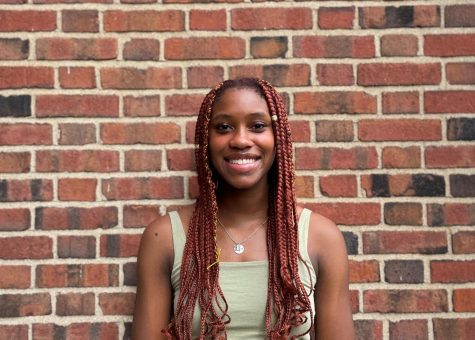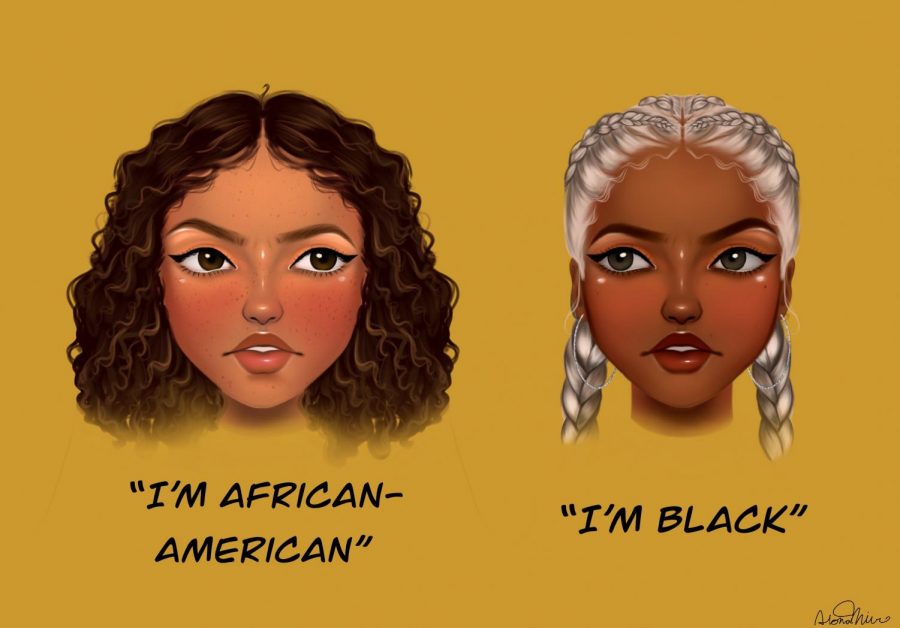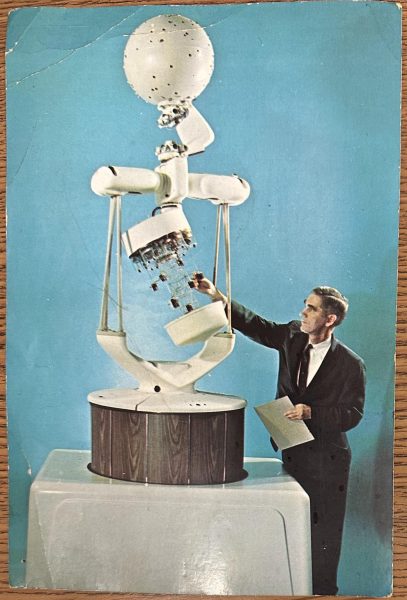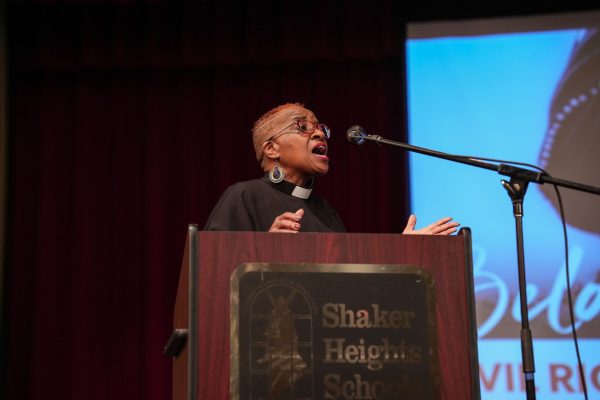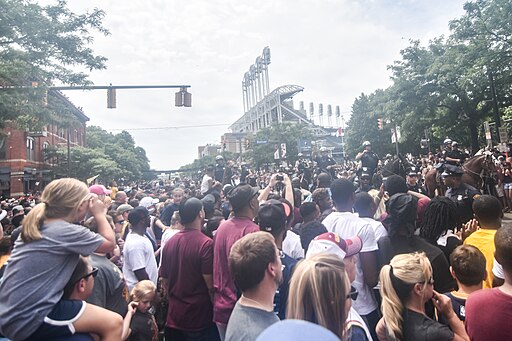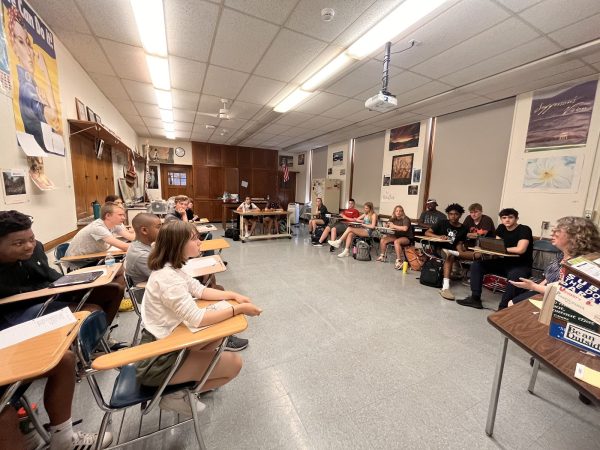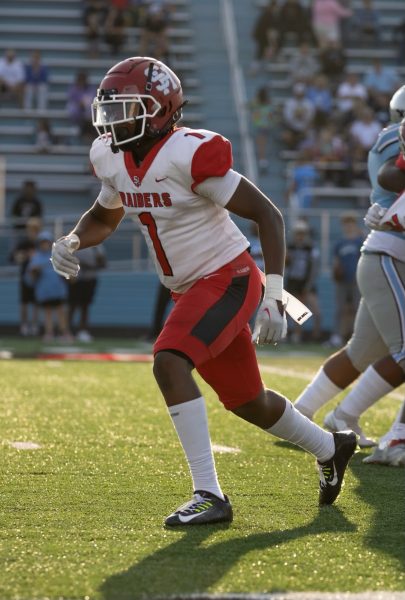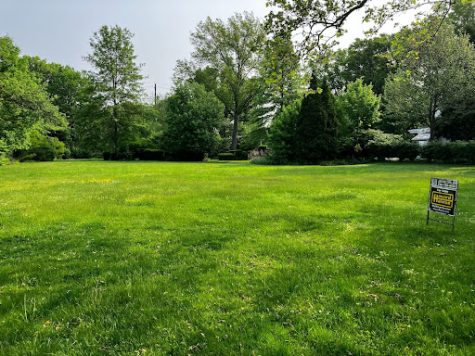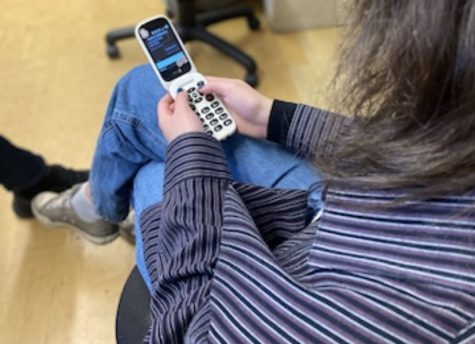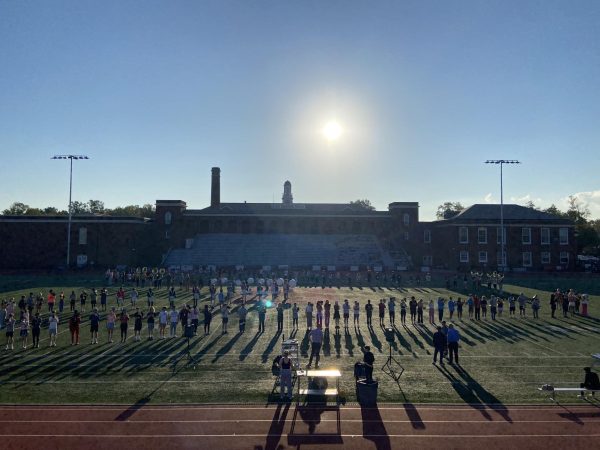More Than Just Words
People struggle to identify themselves as “black” or “African American” due to conflicts with both
Editor’s Note: Amid the resurgence of the term “black” to convey racial identity, The Shakerite Editorial Board met and discussed whether The Shakerite would continue to use “African American,” which has been the news organization’s style since 1992, or “black” moving forward. The board decided to use “black” in order to expand our inclusivity and specificity in accordance with guidelines set by The Associated Press.
When Dr. David Glasner, superintendent, sent an email on Sept. 10, 2019, that stated the district’s intent to focus on “Black students excellence,” he put the district on the side of those who prefer black.
Glasner said that Shaker has begun using the term black rather than African American in its published works. The shift came “because, for state assessment language, the state uses the term black. That may not be the most intellectually rigorous decision, but we wanted to be consistent with the state terminology,” Glasner said.
Evolving language for identifying black people is not a new phenomenon. Over the last century, black people have chosen terms ranging from colored to negro to black to African American, only to reject some of them later. And while the district’s decision was practical, the choice of an identifying term is much more complicated for black people.
MAC Sister Scholars adviser Tracy Williams has experience with each of these terms.“I’m one of those people whose grandmother or great-grandmother might have been colored. My parents, on their birth certificates, were Negro,” she said.
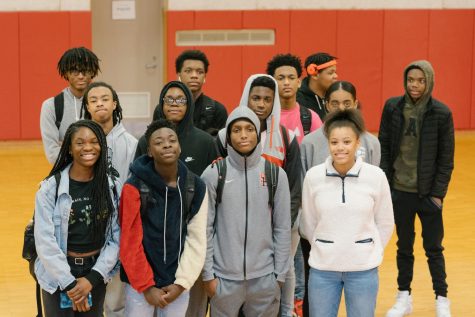
When Williams was in school, Afro-American was the term. Then black took over. “And then, in the ’80s, Jesse Jackson and some other leaders at some point decided on African American,” she said.
Jackson, a civil rights activist, promoted the use of African American in the late 1980s as a way for black people to come to terms with their enslaved past and to embrace their African heritage.
Today, people use both the terms, and there is no way to determine which is right for everyone.
Not everyone wants to be called African American. For some, the term does not adequately portray their heritage. More than 40 million black people live in the United States, but not all of them have African heritage, and the majority of black people worldwide have no American ancestry.
Williams said that African American only applies to black people living in America, but black can describe everyone. “I prefer black because it’s the term that I grew up with and because, for me, it’s an umbrella term that accounts for the entire diaspora, as well as people who are mixed or multiracial but identify with their African American heritage,” she said, “because we’re everywhere.”
Using black includes people of African descent who live on every continent. Sophomore Alina Roach prefers to be called black because her ethnicity is Caribbean. “My mom is actually not from America, and our roots are Carribean, so I’d rather be referred to as black, because African American — when you think about it — means that you’re from Africa and then moved to America but that’s not my lineage,” she said.
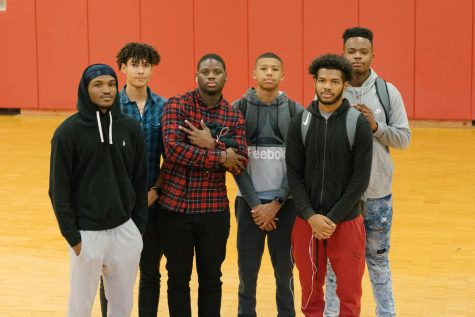
Some people prefer black because they don’t feel any connections to Africa. “I don’t know enough about the African heritage to claim it,” intervention specialist Kimberly Roberts said.
Sophomore Ethan Bryant prefers black, too. “Why should we be called African American if none of us have ever been in Africa, and most of our ancestors were born in America?” he said.
However, entrepreneur Andrea Campbell said that African American is more specific than black. “Black, to me, is a color, for real. I’m not black in the sense of a color, but I do understand what they’re saying. But really, I’m African American,” she said.
Some of those who prefer black say African American is overly sensitive. “I feel that people will say African American in order to not sound racist, and so they tip-toe around the word black. But I prefer black because I am black,” Shaker graduate Felecia Hamilton (’18) said.
Junior Jacqueline Johnson said that she has noticed someone starting to say black and then switching to African American. “It’s kind of weird. Like, it doesn’t offend anyone if you say African American or black, because it’s basically the same thing. I think they feel like it’s a more respectful way to say black, ” she said.
Sophomore Will Votruba, who is white, said that saying African American seems more racist. “I don’t know why, but it just seems worse. We don’t say, European-Americans, so yeah, I say black. And I don’t think there’s anything wrong with saying black.”
Senior Madison Peebles uses the terms interchangeably depending on her environment. “In a school setting, I’m an African American student, somewhere formal. But when I’m, like, chilling somewhere, I’m black. It just depends on where you are,” she said.
Social studies teacher Paul Kelly, who is white, also switches between the terms, depending on who he’s with. “You know who you’re friends with, and you know that they know who you are,” he said. So with his friends, he’ll say black because they know that he’s not using the term in an offensive way.
However, in class, Kelly says African American, because to him, black is more casual.
Denise Harrison, a professor of Pan-African studies at Kent State University, described a situation in which a person’s word choice could be taken offensively. “There are times when somebody says, ‘That black guy,’ and it’s kind of a pejorative term, the way they’re saying it, or, ‘He was African American,’ where that person’s racial identity doesn’t really tell you anything.
“In those instances, I think that’s problematic,” she said.
Harrison said she raises this subject in class every year. “I talk to students about this, especially our students not of color, who oftentimes don’t know what to say. I had an honors class where I just had to have the students say, ‘African Americans, African Americans, blacks, blacks’ because they were so uncomfortable,” she said. She advises those students to ask people what identifying term they use themselves, in the same way that people do for transgender and nonbinary individuals.
On the other hand, some who prefer to be called African American say that black is too harsh. “There’s always been this tension in the black community around owning black, but then also, as people who speak English, the negative connotations that go with the word black,” Williams said.
The Oxford English Dictionary documents nine senses of the word black. The Oxford English Dictionary’s abundant senses of the adjective black, include some that are neutral: the color, any group of dark-skinned people, a kind of tea or coffee, a challenging ski run. Others, however, are negative: evil, wicked, foul, calamitous, dirty, angry and depressing. These negative meanings discourage some people from adopting black as an identifying term.
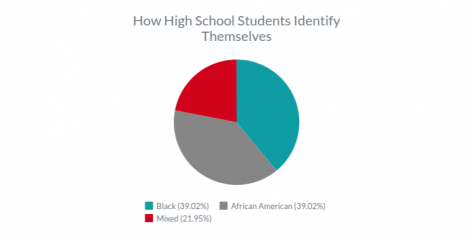
“For a long time, I didn’t like the term black as it’s not truly the color of my skin. My skin is a beautiful brown and should not be subjected to a dark and gloomy color, such as black. But over the years, I’ve grown to accept and love the term black because I’ve chosen to embrace it. Black is beautiful. It is not always gloomy,” a student stated in an anonymous survey.
Johnson said that in the media, darkness and the color black are always bad, while light and the color white are good. “Black is usually the bad guy,” she said.
Sophomore Nadia Seymore prefers to be called African American “because it sounds more professional,” she said.
Williams said that when she was in college in the late ’90s and early 2000s, African American became more popular for academic reasons. “Sometimes, in your writing, it sounded more scholarly,” she said.
Sophomore Ayande Joseph said that he prefers African American. “I feel it’s more respectable and it’s more respectful to our heritage and where we come from,” he said. However, Joseph said he uses black in everyday life because, to him, it’s more natural than saying African American.
To Campbell, this debate is one big identity crisis that other people can’t grasp.“No one else can understand us trying to find our identity because we don’t know our identity,” she said. “We can’t go back to our heritage beyond leaving Africa. Once we left Africa, we lost everything.”
In Campbell’s opinion, picking a term that best describes black people would first require black people to understand themselves and their own history.
To figure out which term he prefers, guidance counselor David Peake asked himself a question, one that anyone might use to decide.
He said, “What’s African about me?”
Black or African American: My Stance
I was filling out a job application when I was asked to identify my “race/ethnicity.” I started to type “black,” but then deleted it and replaced it with “African American.”
I think I did this because honestly, I thought it sounded not necessarily more professional, but less blunt than black.
While writing a feature about whether students prefer to use the term black or African American, I heard so many different opinions and arguments. And yet I still can’t decide which term I prefer.
When I’m talking with my friends, I always say black. I say black in class, and I say black to adults despite their status. I can’t remember the last time I said African American, besides when I was interviewing people for my story and asked which term they preferred.
At first, I definitely preferred to say black. I thought it was annoying when white people would start saying “black,” look at me, and then say, “African American.” Also, African American could refer to a white South African who came to live in America.
I thought of it as a double standard. White people identify as white, not European American or even Caucasian, so why is it such a big deal for us?
Thinking back on that question, though, I realize that it’s an ignorant one. The debate over whether to use the term black or African, in contrast to whether to use white or Caucasian, is just too different in any way that you try to compare it, whether you’re talking about the history or the experience.
However, I came to really like the idea of using African American. I love the idea of using the term to assert common ground for black Americans because we’re all American people with African roots.
However, in regards to the diaspora— which refers to people of African descent who live everywhere— I think black is the better term to use. There are black people all over the world, and they aren’t American. I’ll never forget a tweet I once saw. It went something like this: “My professor is so scared to say black that he calls me African American even though we live in ENGLAND”
However, black truly is a color, so it doesn’t represent everyone. Also, because of colorism– when people believe lighter skin is better — people don’t want to be called black. Instead they say, “I’m a light skin,” or, “I’m a brown skin,” which just separates us even more.
“I think black people struggled — still do struggle, to some degree — with owning their melanin, owing their blackness,” MAC Sister Scholars adviser Tracy Williams said. “I think black people struggled — still do struggle, to some degree — with owning their melanin, owing their blackness.” — Tracy Williams
I, myself, am brown, while my twin sister has light skin. We share the same family history, yet people try to separate us because we are different colors. Despite her light complexion, my sister prefers to be called black.
This whole debate is, as entrepreneur Andrea Campbell said when I interviewed her, “one big identity crisis.” There isn’t a debate — that I’ve heard of— about whether white people should be called white or Caucasian. It’s a common joke that if you were to ask a white person their ethnicity, they might say, “I’m 17 percent Italian, 24 percent Dutch, 52 percent German and 7 percent Native American.” They know all about their history and roots and choose to embrace it, whether it’s studying German in school or eating at an Italian restaurant.
But for black people, we may know that we’re 76 percent Nigerian, but knowing that doesn’t really mean much to us because we don’t know what Nigerian culture is. It is crazy to me that we know about Italian, Korean, and Hawaiin culture, but don’t know about Ghanian culture, Morrocan culture, Ethiopian or Sudanese. Even writing that last sentence, I had to look up the names of more countries in Africa because it’s not something we’re taught about in school, and our parents can’t teach us because they don’t know, either.
David Peake, a high school counselor, attended a cousin’s wedding that was observed as both a Nigerian and American ceremony. “I’m at the African wedding, and all his cousins that are from the continent are there, and they celebrate a different way. There are so many different cultural traditions, and I was thinking about it and I became sad because I liked it. And I wondered what cultural traditions that I don’t even know about, that I’m missing — I don’t even know what I don’t know.
And I was sad because there’s so much rich tradition, all this interesting stuff, and I have no knowledge of it,” Peake said.
He also expressed concern about not using African American, a concern that I share. To say that I’m not African American feels like denying my African-ness, which feels wrong to do, even though I don’t express my African-ness either. 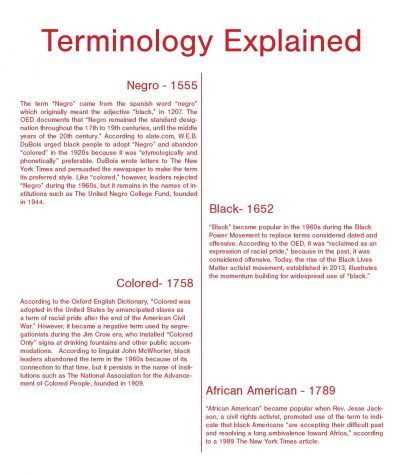
“Just because you were taken from the continent doesn’t mean that you have to completely disassociate yourself from the heritage,” Peake said.
I agree, and it’s not like I don’t want to express my African-ness. It’s that I can’t because I don’t know anything about it. So the biggest problem, for me at least, with not saying African American is that we’ll lose any connection we ever had with Africa.
I learned that for most people it’s not a big deal — which word you use — but I think that everyone should consider which word they prefer to use or be called because it’s a lot deeper than we think.
It’s also important for us to remember that we’re more than just a word or phrase.
Erin Williams
Comment using your Facebook, Yahoo, AOL or Hotmail account
